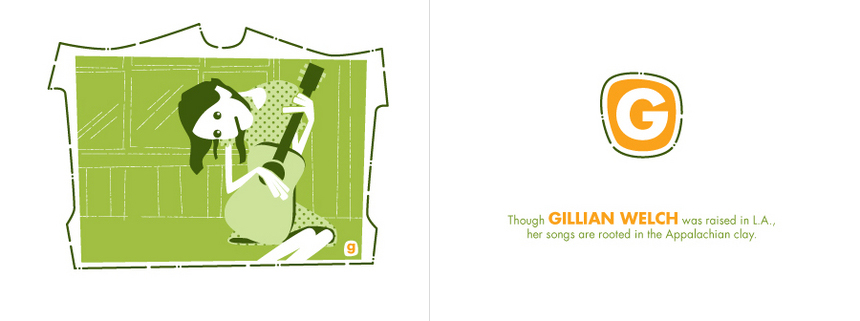postmodernity according to gillian welch and madonna
chalk this up as my absolutely random post of the week. hey, it’s saturday, why not?
quite some time ago, i discovered a hilarious children’s book being published by paste magazine called an indie rock alphabet book. basically, each page pairs up a letter with an indie artist and makes some quirky rhyming sentence. for example, birthdays, puppy dogs, breakfast in bed…nothing could be better than radiohead. great stuff.
my children need this book. 🙂
(likewise, we need to unfill their minds with all the monotone, silly crap-for-music that is pushed off as good for children…but i digress….)

right now, paste is twittering the book, letter by letter. the other day, the letter ‘g’ came up and it was gillian welch (the spread from the book is pictured above), reading though gillian welch was raised in l.a., her songs are rooted in the appalachian way. while i thought that was fun and clever, it also struck me for a whole other reason.
i’m a fan of gillian welch. not a superfan, but a fan. i love her raw, sparse eloquence. she blends beautiful folk sounds with very cultured sensibilities (she refers to her music as “american primitivism”). there’s a certain paradox about gillian welch, and paste’s indie alphabet keenly points that out, stating that despite her very folky, appalachian sound, she was actually raised in los angeles.
further, prior to moving l.a., welch was born in manhattan, went to college in the san francisco bay area and then studied at the berklee college of music in boston. so, to end up recording very rustic, roots music is an unexpected musical trajectory.
there’s a very in-depth and lengthy conversation that would comprise the totality of a discussion concerning postmodernism and its implications, but when i saw the rhyme about gillian welch, it reminded of one facet of this conversation. specifically, it’s the idea that paradox is welcome and common. for example, one, in regards to political strategy, may state they want to create a peaceful world by engaging a war. another example, in regards to postmodernity itself, is that while the postmodern claims that a modern worldview is flawed because its insistency on the certainty of its assertions of truth, the postmodern lives in paradox because of its own insistency of that very claim.
on a much more surface level, the seemingly paradoxical nature of gillian’s welch big city sensibilities leading to the music of appalachian america, is not brought into question in a postmodern world. seamless transition between cultures and art forms are common now, whereas even 50 years ago, those paradoxes would have been difficult to overcome.

another example, from almost 10 years ago, is madonna’s 8th album music. although popular culture is completely pervasive now, if you could take a person in their 60’s or 70’s (or older)—in a cultural vacuum—and show them the cover of the album (pictured above), they might guess that the music is either country or country western or maybe even folk. of course, that sounds silly to us, but remember, on the artwork that supposedly represents the music, madonna is wearing a cowboy hat, western shirt and there’s imagery associated with a rodeo. of course, we know that madonna’s music couldn’t be any less western or country. on this particular album, madonna really channeled retro, electric dance pop—a far cry from boot-stomping country western music.
this is postmodernity. it’s living in paradox. it’s being raised in one of the most forward-thinking big cities in the world and creating stripped-down mountain music. it’s being dressed in traditional cowboy garb and producing music for dance clubs in new york city.
as i stated earlier, there’s a much fuller and complex conversation concerning postmodernism, but the idea of paradox is an interesting facet that both these artist exhibit.
in case you’ve never heard gillian welch’s music, here’s (probably) my favorite song by her (although that’s like picking my favorite child…):
gillian welch: my first lover












